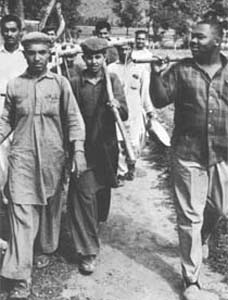
When Ethiopia went to war against neighboring Eritrea in the late 1990s, the U.S. responded by evacuating its Peace Corps volunteers
To Further Global Goals, China Expands Its Role In African Development --- Shrinking U.S. Influence Gives Beijing Chance to Seek Poor Nations' Support --- State Firms Throw Money Around
By Karby Leggett
The Wall Street Journal Europe
ADDIS ABABA, Ethiopia -- When this East African country went to war against neighboring Eritrea in the late 1990s, the U.S. responded by evacuating its Peace Corps volunteers, scaling back military aid and issuing a security warning to U.S. citizens and companies.
The Chinese government had a different reaction. Beijing saw the war -- and the reduced U.S. presence -- as an opportunity to expand its influence. It dispatched even more diplomats, engineers, executives and teachers to Ethiopia. New aid grants soon rolled in, followed by bank credits for Chinese companies operating there.
Today, China's influence in Ethiopia is overwhelming. Its embassy is among the largest in the country and hosts more high-level visits than any Western mission. Chinese companies have become a dominant force, building highways and bridges, power stations, mobile-phone networks, schools and pharmaceutical plants. More recently, they have begun exploring for oil and building at least one Ethiopian military installation.
It is all part of Beijing's broad push into Africa. Aiming to secure access to the continent's vast natural resources, China is forging deep economic, political and military ties with most of Africa's 54 countries. There is more at stake than just fuel for an economic juggernaut, however, say senior Chinese officials, executives and Western diplomats. In Africa, as in many other parts of the developing world, China is redrawing geopolitical alliances in ways that help propel China's rise as a global superpower. China is courting other countries to support its plan to reassert political authority over Taiwan and seeking a counterweight against U.S. power in global bodies such as the United Nations. It is also thinking long-term, cultivating desperately poor nations to serve as markets for its products decades down the road.
For the U.S., China's Africa initiative poses new challenges. Despite a landmark trade pact signed with Africa in 2000, U.S. influence has leveled off in many African countries and in some cases declined. Now, as Washington focuses its attention on the Middle East, it faces a formidable player in a region key to future U.S. economic and security interests.
In oil-rich Nigeria, China is rebuilding the railroad network. In Rwanda, Chinese companies have paved more than 80% of the main roads. In more than a dozen African countries, Chinese firms are searching for oil and gas and rebuilding electricity grids and telephone networks. Chinese companies own one of Zambia's largest copper mines and run a major timber operation in Equatorial Guinea. In tiny Lesotho, Chinese businessmen own and operate nearly half of all the supermarkets and a handful of textile companies.
Though these interests stretch from massive state-funded projects to small private ventures, they all share a common thread: Beijing's policy of actively encouraging its companies and citizens to set up shop in Africa at a record pace.
"China has simply exploded into Africa," says Walter Kansteiner, a former U.S. assistant secretary of state for African affairs. Adds Rep. Ed Royce, a California Republican and vice chairman of a House subcommittee that deals with Africa: "China's increasing engagement in Africa is a concern and we need to focus on it before Beijing becomes fully established."
Last year, Africa supplied more than 15% of U.S. oil imports, and the figure is forecast to rise sharply in the decade ahead. Africa is also becoming a major global supplier for metals, timber and other natural resources.
Yet in some of Africa's most promising commodity markets, China is now challenging U.S. and other Western firms for access to these goods. Since 2000, China's trade with Africa has nearly tripled to almost $30 billion (23.1 million euros). Last year, China spent almost $10 billion on African oil, accounting for nearly one-third of its total crude imports. That is twice as much as it imported from Saudi Arabia, traditionally one of Beijing's biggest suppliers. In oil-rich Angola, where ChevronTexaco Corp. and Exxon Mobil Corp. have large operations, China has become a major buyer and an increasingly active investor.
Unlike the U.S., which bars U.S. companies from doing business with some outlaw regimes, Beijing expresses no qualms about dealing with the continent's most brutal and corrupt leaders. Instead, Chinese leaders prefer to view their relationship through a North-South prism, emphasizing the need for developing nations to band together against the industrialized West. "China is ready to coordinate its positions with African countries . . . with a view to safeguarding the legitimate rights and interests of developing countries," said Chinese Premier Wen Jiabao during a 2003 speech in Ethiopia.
What's more, many Chinese companies operating in Africa are government-owned and less concerned with near-term profits. Indeed, by reaching out to African leaders who are shunned by Western nations, and throwing money at projects Western companies avoid, Chinese officials and businessmen say they are able to secure more business deals and build political influence at a far more rapid pace.
Consider Sudan, a war-torn nation set across from Saudi Arabia on the coast of the Red Sea. In 1997, the U.S. passed a law barring U.S. oil companies from investing there, saying Sudanese leaders had engaged in human-rights abuses and sponsored terrorism. In the years that followed, China invested more than $2 billion in Sudan's oil industry. Today, Sudan provides China with nearly 5% of its annual oil imports. Beijing, meanwhile, has become one of Sudan's largest arms suppliers, according to foreign diplomats and aid workers in the region. China's Foreign Affairs Ministry declined to comment.
More recently, the U.S. sought to impose United Nations sanctions on Sudan amid continuing violence in the Darfur region, where pro-government militiamen have raped and murdered civilians while suppressing a rebel uprising. Beijing deflated these sanction efforts by threatening to use its veto power in the U.N. Security Council. Yet far from seeing itself as complicit in Sudanese violence, Beijing sees the oil project as a symbol of China's reliability when others have left. "It's part of our policy of long-term cooperation that helps both sides," says Li Xiaobing, a senior Africa official at China's Ministry of Commerce.
A similar dynamic is now playing out in Zimbabwe. Over the past three years, the U.S. and European Union imposed sanctions on Zimbabwe's president, Robert Mugabe, and dozens of his closest government officials. In power for 25 years, Mr. Mugabe presides over what is widely regarded as one of Africa's most corrupt and ruthless regimes. Human-rights organizations and Western governments regularly cite his regime for its use of arbitrary arrests, torture and murder to suppress political dissent.
By sanctioning Zimbabwe, the U.S. and EU hoped to isolate and ultimately unseat Mr. Mugabe. China, as a matter of policy, has worked to blunt the impact, boosting aid and investment. Last year, it opened direct flights between the two countries. Chinese leaders still afford Mr. Mugabe huge respect. Since 1980, Beijing has invited the president to China seven times, feting him at banquets. Dozens of Chinese leaders, including former Communist Party boss Jiang Zemin, have visited him.
The close ties are now paying dividends for such companies as China National Aero-Technology Import & Export Corp., or Catic. A trading company jointly owned by two large Chinese aerospace concerns, Catic recently signed a $300 million contract to rebuild Zimbabwe's electricity grid. It has a raft of other deals in the pipeline -- including possible military aircraft sales, company officials say. "We see Zimbabwe as a great opportunity, a great place to make money," says Wang Dawei, the company's vice president.
A spokesman for China's Ministry of Foreign Affairs declined to discuss Mr. Mugabe's human-rights record, saying "China and Zimbabwe have a traditional friendship and a relationship based on cooperation."
There is also a softer side to China's pursuit of Africa. In 2000, Beijing voluntarily waived $1.2 billion in sovereign African debt and it recently agreed to bring some 10,000 African students to China on scholarships. Across Africa, it has dispatched hundreds of doctors and teachers in recent years.
China's ties to Africa date back to the 1950s, when Beijing threw its support behind African independence movements as a way to counter U.S. and Soviet influence in the region. These days, Beijing's emissaries to Africa have swapped their uniforms and weapons for business suits and name cards. In 2000, China established the pro-business China-Africa Cooperation Forum with 44 African nations, paving the way for a free-trade and investment pact with the region.
Few countries have felt China's influence as much as Ethiopia. Though China established relations with Ethiopia in 1970, ties were limited until the mid-1990s. That is when Beijing initiated a broader push across Africa in an effort to secure natural resources and political influence on the continent.
A decade later, Ethiopia has become a reflection of China's wider ambitions in Africa and the changes it portends for the region. A poor, landlocked nation of 68 million people, Ethiopia lacks the vast natural resources that have drawn China's interest in other countries. But it has something else Beijing craves: geopolitical clout in the region. Ethiopia is the source of the Blue Nile, the river that slakes Egypt's thirst. It is the meeting ground between largely Muslim north Africa and the Christian south. And it is the seat of the African Union, the political body that represents the continent.
Wu Ping, a tall man in his mid-40s, was one of Beijing's pioneers in Africa. In 1993, he was dispatched to Ethiopia by Catic, the firm rebuilding Zimbabwe's electricity grid. His simple orders: Open a trade company and develop political relationships. Mr. Wu began by selling things like milling equipment for sugar cane. Later he branched into tractors. Though he made little money, he forged close relations with Ethiopian officials, partially, he says, by paying the occasional bribe. "Sometimes it's the only way to get things done in Africa," he says. A Catic spokesman in Beijing says the company has a strict internal policy against paying bribes and denies it is a widespread problem.
Today, Mr. Wu drives around Addis Ababa in a Toyota Land Cruiser and presides over a growing business empire. His latest project: an $11 million airport hangar that, when complete later this year, will be able to house the world's largest aircraft.
To secure the contract, Mr. Wu beat out an Australian company by deliberately underbidding the contract. Though he will incur a loss on the deal, he says it is all part of Catic's strategy. "Almost every African leader passes through this airport to attend meetings at the African Union," he says, standing a short distance from dozens of Chinese and African workers working at the construction site. "So they will all see our hangar."
Even more important, Mr. Wu says the owner of the hangar, Ethiopia Air, is mulling a large order of propeller aircraft, and the hangar contract has opened the door with officials who will play a role in that decision. "That's my company's real goal in Africa -- to sell airplanes, both commercial and military," he says.
Unlike Mr. Wu, Deng Guoping, general manager of China Road & Bridge Corp., says he isn't sure his company will ever make money here. In the past six years, Mr. Guo has paved five highways stretching roughly 500 kilometers. Three more roads are under construction and he is bidding on another three.
In all, Chinese contractors have stitched together a road network that reaches Ethiopia's northern border with Sudan to the eastern seaport of Djibouti to the southern border area with Kenya. China Road secured most of its contracts through public tenders. Yet Mr. Deng says he is instructed to slice projected profit margins so thin -- about 3% -- that losses are inevitable, given perennial cost overruns in Africa. Western businesses, by contrast, typically pad bids with projected profits of 15% and more. Even so, Mr. Deng is looking at a range of new projects, including water reservoirs, airport facilities and a railway project. "We're a government company and the Chinese government wants us here building things," he says.
The U.S. still provides Ethiopia with more assistance than any other nation, nearly $500 million last year. But for U.S. companies, Ethiopia's small market and unreliable legal system makes the country a risky place to do business. One of the only U.S. companies with substantial business in Ethiopia is Boeing Co., which supplies Ethiopia Air with the jets for its international routes.
In contrast, Chinese companies say Ethiopia's shaky legal framework sometimes helps advance Beijing's wider goals. The story of Jiangxi International Economic & Technical Cooperation Co., another state firm active in Ethiopia, explains how. A few years ago, a flood in Ethiopia left a few hundred people homeless. Not long after, Beijing pledged about $4 million to build them new homes. It hired Jiangxi International as contractor. At a groundbreaking ceremony, China's ambassador and Ethiopian officials shook hands and smiled for photographers.
About a year later, eight modern apartment buildings were completed. But the homeless families never moved in. Instead, the complex was handed to Ethiopia's Ministry of Defense, which used the buildings to house its own personnel. Today, a corrugated metal fence rings the complex, with a small group of guards stationed at one corner. "We don't really care who uses it," says a senior executive at Jiangxi International, requesting his name not be used. "It was a political task for us and so long as Ethiopia officials are happy, our goal is fulfilled."
A spokesman for Ethiopia's Ministry of Defense said the flood victims didn't like the apartments and were relocated to another neighborhood, and that the ministry later purchased the apartment block.
Lately, Beijing has begun winning projects that have geopolitical relevance, such as Ethiopia's Takazee Dam -- a massive, $300 million hydropower station that is rising on the headwaters of the Blue Nile River. Set deep in a mountainous region near the border with Sudan and Eritrea, the Takazee Dam has been on Ethiopia's drawing board for more than a decade. But getting it off the ground hasn't been easy, thanks to Egypt. Cairo has long feared any project that could affect the flow of the Nile, viewing its own access to those waters as a matter of national security. Indeed, so great was its concern over Takazee that Egyptian officials have made clear that any attempt to divert Nile water could result in military action, according to senior Chinese and Egyptian officials.
That warning scared off the World Bank and other international financial organizations, and also raised concern among potential foreign contractors. Several years ago, Ethiopia announced it would finance the project on its own. Though a handful of Western contractors submitted bids, the Ethiopian government awarded the project to Chinese companies.
Today, the Takazee Dam is inching toward completion. Already, hundreds of Chinese engineers have carved out a vast administrative camp, an underground tunnel nearly 1.6 kilometers long and deep caves that will hold massive power turbines. Later this year, they will begin pouring the 180-meter-high cement dam. Once complete, the Takazee dam will stand as one of Africa's largest, and will help change the lives of those who live in northern Ethiopia, where electricity is often nonexistent. Ultimately, some of the power could be pooled into a region power grid.
That would allow neighboring countries to tap into the power. And it would also further China's ambition of expanding oil and mineral exploration in the region, particularly in southern Sudan. Says Girma Biru, Ethiopia's Minister of Trade: "China has become our most reliable partner and there is a lot we can learn from Beijing, not just in economics but politics as well."














